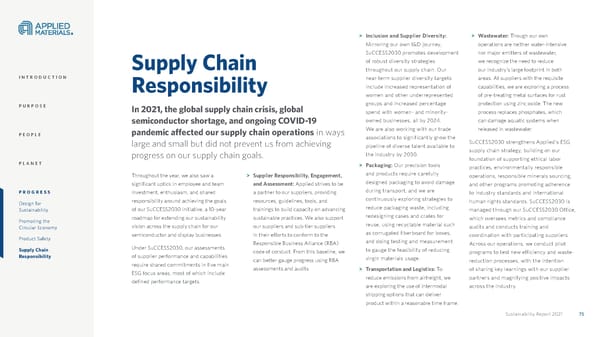Sustainability Report 2021 75 Sustainability Report 2021 75 Supply Chain Responsibility In 2021, the global supply chain crisis, global semiconductor shortage, and ongoing COVID-19 pandemic affected our supply chain operations in ways large and small but did not prevent us from achieving progress on our supply chain goals. Throughout the year, we also saw a significant uptick in employee and team investment, enthusiasm, and shared responsibility around achieving the goals of our SuCCESS2030 initiative, a 10-year roadmap for extending our sustainability vision across the supply chain for our semiconductor and display businesses. Under SuCCESS2030, our assessments of supplier performance and capabilities require shared commitments in five main ESG focus areas, most of which include defined performance targets. > Supplier Responsibility, Engagement, and Assessment: Applied strives to be a partner to our suppliers, providing resources, guidelines, tools, and trainings to build capacity on advancing sustainable practices. We also support our suppliers and sub-tier suppliers in their efforts to conform to the Responsible Business Alliance (RBA) code of conduct. From this baseline, we can better gauge progress using RBA assessments and audits. > Inclusion and Supplier Diversity: Mirroring our own I&D journey, SuCCESS2030 promotes development of robust diversity strategies throughout our supply chain. Our near-term supplier diversity targets include increased representation of women and other underrepresented groups and increased percentage spend with women- and minority- owned businesses, all by 2024. We are also working with our trade associations to significantly grow the pipeline of diverse talent available to the industry by 2030. > Packaging: Our precision tools and products require carefully designed packaging to avoid damage during transport, and we are continuously exploring strategies to reduce packaging waste, including redesigning cases and crates for reuse, using recyclable material such as corrugated fiberboard for boxes, and doing testing and measurement to gauge the feasibility of reducing virgin materials usage. > Transportation and Logistics: To reduce emissions from airfreight, we are exploring the use of intermodal shipping options that can deliver product within a reasonable time frame. > Wastewater: Though our own operations are neither water-intensive nor major emitters of wastewater, we recognize the need to reduce our industry’s large footprint in both areas. At suppliers with the requisite capabilities, we are exploring a process of pre-treating metal surfaces for rust protection using zinc oxide. The new process replaces phosphates, which can damage aquatic systems when released in wastewater. SuCCESS2030 strengthens Applied’s ESG supply chain strategy, building on our foundation of supporting ethical labor practices, environmentally responsible operations, responsible minerals sourcing, and other programs promoting adherence to industry standards and international human rights standards. SuCCESS2030 is managed through our SuCCESS2030 Office, which oversees metrics and compliance audits and conducts training and coordination with participating suppliers. Across our operations, we conduct pilot programs to test new efficiency and waste- reduction processes, with the intention of sharing key learnings with our supplier partners and magnifying positive impacts across the industry. INTRODUCTION PURPOSE PEOPLE PLANET PROGRESS Design for Sustainability Promoting the Circular Economy Product Safety Supply Chain Responsibility
 Applied Materials Sustainability Report Page 74 Page 76
Applied Materials Sustainability Report Page 74 Page 76